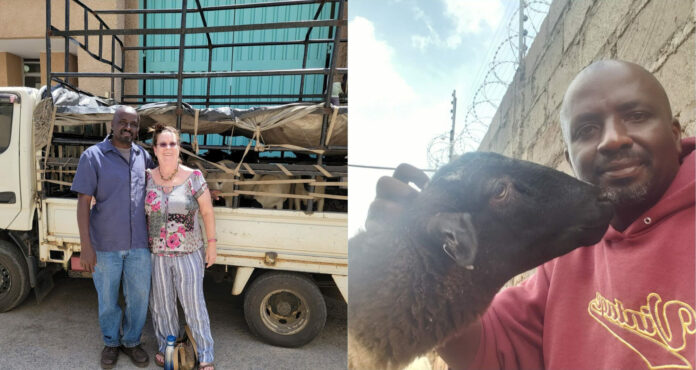How many people can leave a well-paying top job at the popular Wall Street in the US, and prefer to do Dorper sheep farming in Kenya? This is a straightforward answer for many
This would take an immense load of passion for the animals. James and his wife Beth Kahiga, formerly worked at the famous US Wallstreet at Oppenheimer & Company.
Despite knowing a lot about finance and data analytics, the couple chose to leave their city jobs on Wall Street for a quieter life in Kasuku, along the Nyahururu-Nyandarua highway.
James and his wife initially joined the farming business with little knowledge about it. They are now experts, focusing on selling Dorper sheep breeds rather than selling the animals for meat.
The couple owns Carpri Dorper Farm Ltd which was established in 2019. James mentioned in an interview with Farm Business EA that he got many of his rams and ewes from South Africa.
Most of them are Type 5s, which are top-grade animals. They also have local Dorper sheep from Kiambu Northlands and Kajiado County.
James chose to source his sheep from abroad for quality reasons. He insists that quality should never be compromised in Dorper farming.
Evans Kibor: I became the richest Dorper sheep farmer after quitting banking
To ensure this, James reached out to two well-known South African Dorper sheep farmers, Albie Horn and Mickey Phillips, for imports. When his sheep arrived in Kenya, he had to get customs and veterinary clearance.
“The crucial information you need to get from the previous owner is deworming and vaccination,” he said.
He noted that the main challenge Dorper sheep farmers encounter in Kenya is inbreeding. To address this, James ensures diversity in the genetic pool of offspring by breeding top-grade animals with locally sourced ones.
As a result, the offspring on his farm are classified into two groups: purebred sheep and percentage sheep.
“You can have a pure breed animal, which is very important but management is equally important. Good record keeping, good deworming, good vaccinations… I think that’s why South Africa is ahead of us,” he noted.
On his farm, James ensures that his animals receive between 1-3 kilograms of silage daily, along with other supplements like sunflower. With over 150 animals on his farm, he produces almost 7 tonnes of silage per month.
In designing his farm, James took courses that specialised in small ruminants from Oklahoma State University and Michigan State University.
The institutions suggested that small ruminants need 40m²; 20m² for eating and sleeping and another 20m² for an outside paddock.
“One of the things we have discovered, the instances of diseases are less. These animals are not stressed. A stressed animal will get sick,” he continued.
Before moving to Kenya for Dorper sheep farming, James visited large-scale sheep farms with capacities of up to 4,000 animals to learn from them.
He observed that the sheep all slept on the ground. James has adopted this practice because he believes it is the best way to control ammonia and bacteria.
His entire farming complex measures 157 ft by 40 ft. He has 5 paddocks where he keeps different sheep breeds according to his preference. James’ farm also operates on solar power for electricity.
To import a quality T5 ram from South Africa, one should budget a minimum of Sh. 300,000 to bring a single animal to JKIA. After sourcing these animals, James breeds them to produce the best quality offspring, which he then sells for over Sh. 100,000 each.
“Before you buy an animal with us, we need to sit with you. We need to show you how we have managed them. We need them to thrive for you. We need to have a relationship with our customers.”








